 Petzlover
Petzlover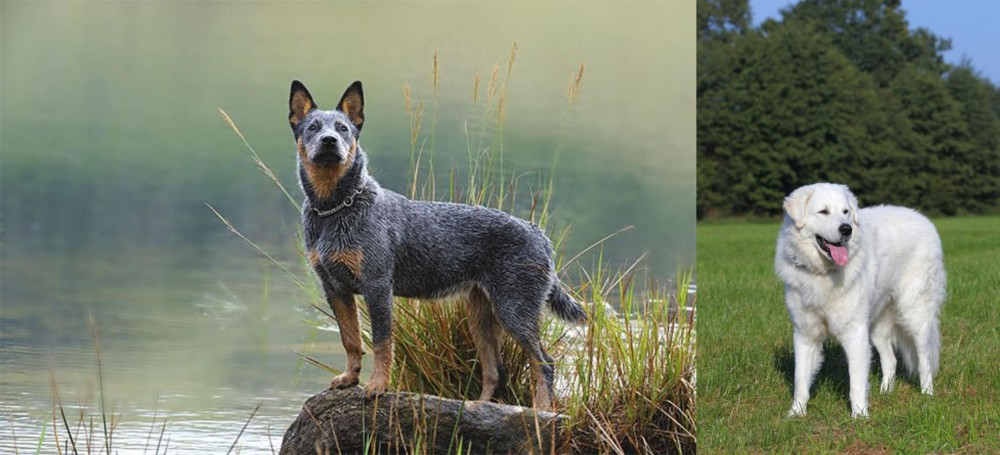 Blue Healer is originated from Australia but Kuvasz is originated from Hungary. Blue Healer may grow 25 cm / 9 inches shorter than Kuvasz. Blue Healer may weigh 30 kg / 66 pounds lesser than Kuvasz. Blue Healer may live 3 years more than Kuvasz. Both Blue Healer and Kuvasz has almost same litter size. Blue Healer requires Low Maintenance. But Kuvasz requires Moderate Maintenance
Blue Healer is originated from Australia but Kuvasz is originated from Hungary. Blue Healer may grow 25 cm / 9 inches shorter than Kuvasz. Blue Healer may weigh 30 kg / 66 pounds lesser than Kuvasz. Blue Healer may live 3 years more than Kuvasz. Both Blue Healer and Kuvasz has almost same litter size. Blue Healer requires Low Maintenance. But Kuvasz requires Moderate Maintenance
 It was in 1802 that George Hall arrived in New South Wales, establishing 2 cattle stations. He had a problem – getting his thousands of cattle to the Sydney markets. He began looking at the prospect of a droving dog and imported a number of dogs of which a blue mottled dog emerged.
It was in 1802 that George Hall arrived in New South Wales, establishing 2 cattle stations. He had a problem – getting his thousands of cattle to the Sydney markets. He began looking at the prospect of a droving dog and imported a number of dogs of which a blue mottled dog emerged.
The dogs were crossed with dingoes and by 1840 the Halls Heelers were used by the Halls. However with the death of one of the Halls, their cattle stations went to action and the dogs, the Halls Heelers became available.
The dogs attracted attention, and the term ‘Australian Cattle Dog’ was adopted. The name referred to those dogs coming from Thomas Hall's ‘Heelers’. There have been many arguments about the origin of the breed, but the red or blue offspring known as Hall's Heelers were proven cattle drovers, and with further breeding experiments which included the Australian Kelpie, dingoes and the Dalmation, by 1893, the tough, robust working breed known as the Blue Heeler or the Australian Cattle Dog came about.
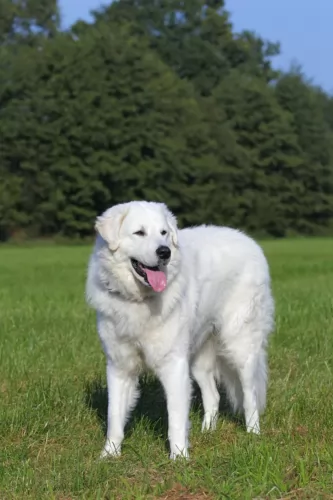 The Kuvasz is an ancient dog breed from Hungary. It is believed that the dog is the oldest of the ancient Hungarian dog breeds, and in fact a fossilized skeleton dating back to the 9th century, and almost identical to the modern Kuvasz, was found near Keszthely.
The Kuvasz is an ancient dog breed from Hungary. It is believed that the dog is the oldest of the ancient Hungarian dog breeds, and in fact a fossilized skeleton dating back to the 9th century, and almost identical to the modern Kuvasz, was found near Keszthely.
During the 15th century the Kuvasz became very sought after, being found in royal courts. Puppies were given as royal gifts. Later the popularity of the breed waned and then it was found in its traditional role of guarding livestock.
As Kuvasz numbers dwindled, breeding efforts were started but it is believed that other large dogs such as the Great Pyrenees were used with the Kuvasz to continue with the breeding programs.
In 1884, the first Hungarian standard for the breed was written. It was in 1966 that the Kuvasz Club of America was established.
 Blue Heelers are medium-sized, sturdy, compact dogs who are somewhat longer than tall. The female Blue Heeler measures roughly 43–48cm at the withers, while the male measures about 46–51cm. If your Blue Heeler is in tip top condition, he’ll weigh about 15 to 22 kilograms. They are muscular with pointed, erect ears, dark eyes and long tails which are mostly hanging downwards. Their dense coats are blue- or red speckled and sometimes with tan markings.
Blue Heelers are medium-sized, sturdy, compact dogs who are somewhat longer than tall. The female Blue Heeler measures roughly 43–48cm at the withers, while the male measures about 46–51cm. If your Blue Heeler is in tip top condition, he’ll weigh about 15 to 22 kilograms. They are muscular with pointed, erect ears, dark eyes and long tails which are mostly hanging downwards. Their dense coats are blue- or red speckled and sometimes with tan markings.
The Blue Heeler is a ball of energy and he is clever too. You won’t find him sitting around for too long, and if there is sign of a walk or a ball game, he’s in! He is an independent dog, and although he makes a wonderful family pet, he tends to attach himself to that one special person in his life. He is a natural watchdog and protector of his human family.
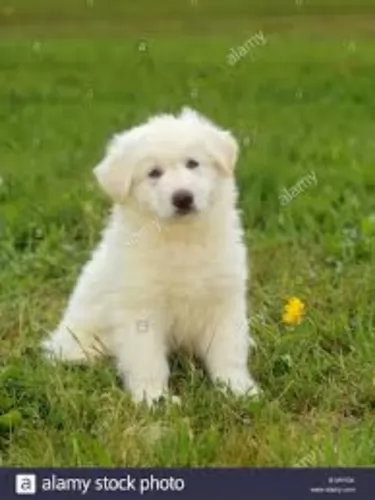 The beautiful Kuvasz is a large, muscled dog standing at 65 – 76cm in height and weighing 35 – 52kg. He has a double coat of dense white hair which can be straight or wavy.
The beautiful Kuvasz is a large, muscled dog standing at 65 – 76cm in height and weighing 35 – 52kg. He has a double coat of dense white hair which can be straight or wavy.
It is natural for the dog to lose most of the long coat during the Summer months. In other words this dog has a seasonal coat.
The nose is black, the eyes brown and alert, the ears are of medium length and floppy and the tail is carried long and low.
The Kuvasz is an intelligent dog who will benefit from training and socialization. It is always wise to have large dogs like this trained because just his size can cause problems if he isn’t obedient.
He is also described as a clownish type of dog which means he’ll entertain and amuse you. Certainly he is playful as a puppy but he calms down quite a bit as he grows into maturity. He is independent, and those who have owned such a dog report that he can be loving and loyal with his human family, wanting to guard and protect them. Others will say that he tended to be aloof, even with his human family.
Used as working dogs, the Kuvasz has learned to be independent and they will need a firm, strong owner who is also fair with them, otherwise they just do their own thing. They’re active dogs and because of their size they won’t suit city living where there is a tiny garden.
 Training and socializing of your Blue Heeler will ensure that your dog does what you want him to. The Blue Heeler is an intelligent, responsive dog and training can benefit him, turning him into an outstanding family pet, good with children and other pets in the home.
Training and socializing of your Blue Heeler will ensure that your dog does what you want him to. The Blue Heeler is an intelligent, responsive dog and training can benefit him, turning him into an outstanding family pet, good with children and other pets in the home.
He is a playful, affectionate pet who doesn’t take easily to strangers, and this is what makes him such an excellent guard dog.
Your Blue Heeler is not an apartment dog as he requires a lot of exercise, and cooping him indoors for too long with nothing to do can lead to destructive behavior.
Head-strong, independent and robust, your Blue Heeler will need a firm owner who is boss. Add to the firm owner a lot of love and care, and you’ll have a devoted friend.
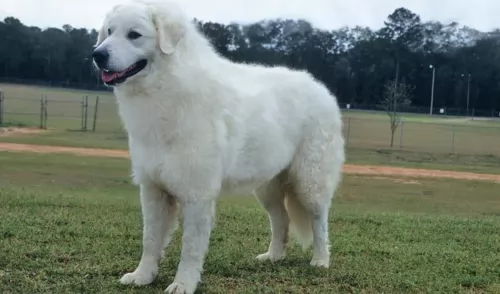 Kuvasz are guarding dogs, they’re intelligent and loyal, making them excellent family dogs with the right training and socialization.
Kuvasz are guarding dogs, they’re intelligent and loyal, making them excellent family dogs with the right training and socialization.
They’re able to get on well with other pets in the home as well as children. He is a beautiful dog and another bonus is that he isn’t particularly high maintenance.
As is common with many other large-breed dogs, he will have a shorter lifespan than what you’d get with a smaller dog breed, but if you feed him high quality food, exercise him and involve him in your activities, this large dog can become a wonderful friend and protector for you.
 Australian cattle dogs are healthy and can live up to 15 years of age, but even so there are some genetic conditions that you will need to be aware of following
Australian cattle dogs are healthy and can live up to 15 years of age, but even so there are some genetic conditions that you will need to be aware of following
Eye issues which includes progressive retinal atrophy – this disease is an inherited disease of the retina of the eye where the rod cells are destined to die. Fortunately it is not painful for the dog. There are different types of inherited retinal degenerative diseases in dogs but going into detail with them is beyond the scope of this article. For more information you can chat to your vet.
Recessive piebald elleles - the Blue Heeler has recessive piebald alleles which can produce white in the skin and coat and which is linked to congenital hereditary deafness.
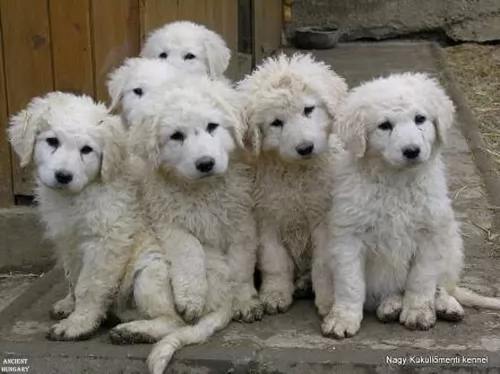 The large Kuvasz is a healthy dog breed that with good care can reach 12–14 years of age. Being the large dog that he is, he may well be prone to bone and joint problems. It is why good nutrition is so important for this dog - feeding him the best food with vitamins and minerals.
The large Kuvasz is a healthy dog breed that with good care can reach 12–14 years of age. Being the large dog that he is, he may well be prone to bone and joint problems. It is why good nutrition is so important for this dog - feeding him the best food with vitamins and minerals.
You know the saying ...you are what you eat... and this applies to dogs too. Good food can help to ward off serious illnesses. Big dogs like this often have to contend with hip dysplasia which can be both painful and debilitating as well as eye diseases.
This is where the eyelid of the dog rolls inwards, causing irritation and pain for the dog. There is also Ectropion, where the eyelid rolls outwards.If you see your pet has a red eye which is watery and which has pus, visit your vet. Entropion surgery will correct and repair and condition.
 Remember that your Blue Heeler was once a full time cattle dog where he used to become totally and utterly exhausted from herding cattle. This is what he loved – the activity. If you have a Blue Heeler, you will need to provide him with plenty of exercise.
Remember that your Blue Heeler was once a full time cattle dog where he used to become totally and utterly exhausted from herding cattle. This is what he loved – the activity. If you have a Blue Heeler, you will need to provide him with plenty of exercise.
If you live on a farm, your Blue Heeler will be in his element because he can run, walk and swim to his heart’s content. If you keep your Blue Heeler in your back garden, you will need to provide him with ball games, rope games, long walks, running on a leash as you cycle and other activities.
Your Blue Heeler has a short, weather-resistant double coat. He’s not a heavy shedder, but he will have his share of seasonal shedding, so it’s a good idea to get into the habit of brushing him at least twice a week. This will get rid of all those loose hairs and keep his skin healthy by getting the blood flowing and distributing his natural oils.
Giving the best dog food for your Blue Heeler will come from either your home made food or a top quality commercially manufactured dog food. He is such a high energy dog, that your veterinarian can advise you on a dog food specially designed for high energy breeds.
These foods are well balanced and are enriched with amino acids and vitamins, promoting healthy bones and joints. Remember to include some raw meat into your dog’s diet and to ensure a constant source of cool, fresh water.
Ensure your Blue Heeler’s ongoing health by paying attention to ears, nails and teeth.
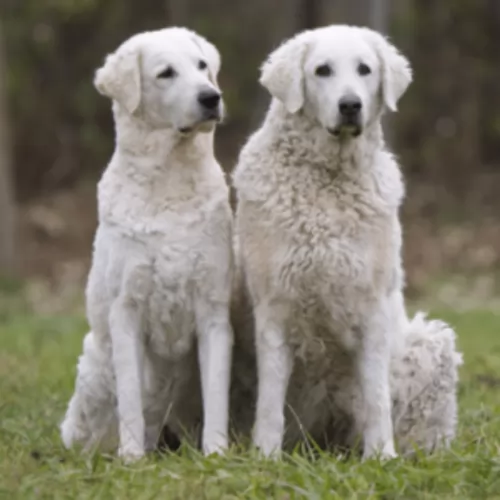 The coat may be fairly long and thick but it doesn’t require any special kind of grooming. A good brush twice a week will be adequate and will help with getting rid of stubborn knots and matting.
The coat may be fairly long and thick but it doesn’t require any special kind of grooming. A good brush twice a week will be adequate and will help with getting rid of stubborn knots and matting.
He is a seasonal shedder and this frequent brushing will make sure the coat remains groomed and shiny.
The Kuvasz is a hardy breed who just loves the outdoors. He is a dog that doesn’t do well in the heat. Make absolutely sure that he has a cool, sheltered spot where he can lie down. Ensure that there is always a bowl of fresh, cool water available to him.
There is quite a bit of conflict and controversy regarding nutrition in dogs. The idea is to keep it simple. If you buy a commercially manufactured dog food, check the ingredients on the packaging.
You want to be sure your pet is getting vitamins and minerals in instead of preservatives, fillers and colorants. Try and give him some home made food too such as some chicken, brown rice or pasta and some vegetables. You can mix this into his dry kibble occasionally with a little bit of raw meat too when you have.
Avoid feeding your dog things such as chocolates, nuts, onions, sweets and chips.